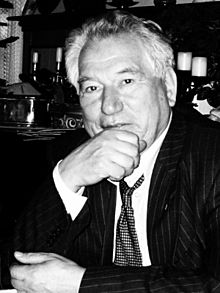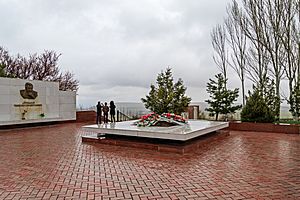Chinghiz Aitmatov facts for kids
Quick facts for kids
Chinghiz Aitmatov
|
|
|---|---|

Aitmatov in 2003
|
|
| Born | 12 December 1928 Sheker, Kirghiz ASSR, Soviet Union |
| Died | 10 June 2008 (aged 79) Nuremberg, Germany |
| Genre | novels, short stories |
| Notable works | Jamila, The Day Lasts More Than a Hundred Years |
Chinghiz Aitmatov (pronounced Chin-giz Ait-ma-tov) was a famous writer from Kyrgyzstan. He was born on December 12, 1928, and passed away on June 10, 2008. He wrote most of his stories and novels in Russian, but he also wrote in Kyrgyz. Aitmatov is known as one of the most important figures in the literature of Kyrgyzstan.
Contents
About Chinghiz Aitmatov's Life
His Early Years and Family
Chinghiz Aitmatov was born in a village called Sheker. His father was Kyrgyz, and his mother was Tatar. Both of his parents worked for the government. In 1937, when Chinghiz was young, his father was arrested in Moscow due to political accusations. Sadly, his father was executed the next year, in 1938.
Growing Up in the Soviet Union
Aitmatov grew up during a time of big changes in Kyrgyzstan. His home country was changing from being a far-off part of the Russian Empire to becoming a republic within the USSR. He went to a Soviet school in Sheker.
Chinghiz started working at a very young age. When he was just fourteen, he helped the Secretary of the Village Council. He also worked as a tax collector, a loader, and an engineer's assistant. He had many different jobs throughout his early life.
His Education and First Writings
In 1946, Aitmatov began studying at the Animal Husbandry Division of the Kirghiz Agricultural Institute in Bishkek. Later, he decided to study literature. He went to the Maxim Gorky Literature Institute in Moscow from 1956 to 1958.
After his studies, he worked for a newspaper called Pravda for eight years. His first two stories were published in Russian in 1952. His first work published in Kyrgyz was "White Rain" in 1954. His very famous story, "Jamila", came out in 1958.
Later Life and Achievements
In 1961, Aitmatov was a judge at the 2nd Moscow International Film Festival. He was also a judge at the 7th Moscow International Film Festival in 1971. His first major novel, The Day Lasts More Than a Hundred Years, was published in 1980. Another important novel, The Place of the Skull, came out in 1987. Many of his books were translated into different languages around the world.
He continued to be involved in film. In 1994, he was a judge at the 44th Berlin International Film Festival. In 2002, he was the head judge at the 24th Moscow International Film Festival.
His Final Years
Chinghiz Aitmatov became ill with kidney failure. On May 16, 2008, he was taken to a hospital in Nuremberg, Germany. He passed away from pneumonia on June 10, 2008, at 79 years old. After his death, his body was flown back to Kyrgyzstan. Many ceremonies were held before he was buried in the Ata-Beyit cemetery. He had helped to create this cemetery, and it is likely where his father is also buried.
The New York Times newspaper described him as a writer who "gave a voice to the people of the remote Soviet republic of Kyrgyz." They also mentioned that he later became a diplomat and a friend and advisor to the Soviet leader Mikhail Gorbachev.
Chinghiz Aitmatov's Works
His Writing Style and Themes
Chinghiz Aitmatov was part of the generation of writers who wrote after World War II. His early works included some short stories and a short novel called Face to Face. However, it was his novel Jamila that truly showed his talent.
Jamila is told through the eyes of a teenage boy. It tells the story of Jamila, a village girl whose husband is away fighting in the war. She falls in love with a disabled soldier who is staying in their village. They work together to harvest and transport grain.
Other important works by Aitmatov include the short novels Farewell, Gulsary!, The White Ship, The Day Lasts More Than a Hundred Years, and The Place of the Skull.
Awards and Recognition
Aitmatov received the Lenin Prize in 1963 for his collection of stories called Tales of the Mountains and Steppes. This collection included Jamila, The First Teacher, and Farewell, Gulsary!. He also won a State prize for Farewell, Gulsary!. Many people admired his writing, and even critics praised the high quality of his novels.
Folklore and Animals in His Stories
Aitmatov's writing has some special features. He often used folklore and old tales, but in a new way. He would take ancient stories and mix them with modern life. You can see this in almost all his works. He often refers to a myth, a legend, or a folktale. For example, in The Day Lasts More Than a Hundred Years, a sad legend about a captive who loses his memory becomes a powerful symbol in the novel.
His stories also talk about how Kyrgyzstan changed from being part of the Russian Empire to a republic of the USSR. They show how people's lives were affected by these changes. In Farewell, Gulsary!, the story is about the friendship between a man and his horse. But it also shows the sadness and loss that many Kyrgyz people felt because of the political changes and the Soviet government.
Another important part of Aitmatov's writing is his deep connection to animals. He believed that human lives and animal lives are closely linked. In Farewell, Gulsary!, the two main characters are a man and his stallion. A camel plays a big role in The Day Lasts More Than a Hundred Years. The Place of the Skull begins and ends with the story of a wolf pack and their leader, Akbara. Human lives are woven into the stories of these animals.
His Works on Screen
Some of Chinghiz Aitmatov's stories were made into movies. These include The First Teacher (1965), Jamila (1969), and Red Scarf (1970), which was later known as The Girl with the Red Scarf (1978).
Writing in Two Languages
Like many educated people in Kyrgyzstan, Aitmatov spoke both Kyrgyz and Russian very well. He once said that Russian was as much his native language as Kyrgyz. He wrote most of his early works in Kyrgyz. He sometimes translated these into Russian himself, or other translators did it. After 1966, he mainly wrote in Russian.
Diplomatic Career
Besides being a writer, Chinghiz Aitmatov also had a career in diplomacy. From 1990 to 1993, he was the ambassador for the Soviet Union (and later Russia) to Belgium. After that, he became the ambassador for Kyrgyzstan to the European Union, NATO, UNESCO, and the Benelux countries.
Major Works by Chinghiz Aitmatov
- A Difficult Passage ("Трудная переправа", 1956)
- Face to Face ("Лицом к лицу", 1957)
- Jamila / Jamilia ("Джамиля", 1958)
- Duishen / The First Teacher ("Первый учитель", 1962)
- Red Scarf (Kyrgyz: "Кызыл Жоолук" / "Kızıl Jooluk", 1963)
- Tales of the Mountains and Steppes ("Повести гор и степей", 1963)
- Farewell, Gulsary! ("Прощай, Гульсары", 1966)
- Lightning Voiced Manaschi (Kyrgyz: "Чагылган үндүү Манасчы" / "Chaqylgan Unduu Manaschi")
- The White Steamship / The White Ship ("Белый пароход", 1970)
- The Ascent of Mt. Fuji ("Восхождение на Фудзияму", 1973)
- Piebald Dog Running Along the Shore / Spotted Dog Running Along the Seashore (Kyrgyz: "Деңиз Бойлой Жорткон Ала Дөбөт / Deniz Boyloy Jortkon Ala Dobot"; Russian: "Пегий пес, бегущий краем моря", 1977)
- Cranes Fly Early (Ранние журавли, 1979)
- The Day Lasts More Than a Hundred Years ("И дольше века длится день", 1980)
- The Place of the Skull ("Плаха", 1987)
- The time to speak out (1988)
- Time to Speak (1989)
- Cassandra's Brand ("Тавро Кассандры", 1996)
- When The Mountains Fall ("Когда горы падают", 2006)
- Ode to the Grand Spirit: A Dialogue with Daisaku Ikeda (2009)
|
See also
 In Spanish: Chinguiz Aitmátov para niños
In Spanish: Chinguiz Aitmátov para niños
 | Georgia Louise Harris Brown |
 | Julian Abele |
 | Norma Merrick Sklarek |
 | William Sidney Pittman |



